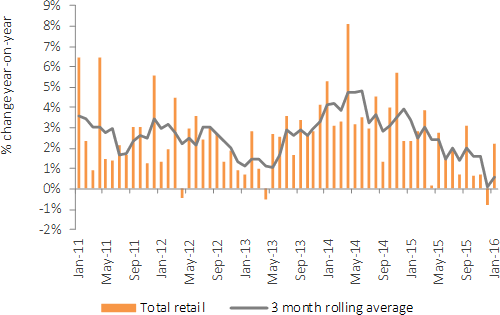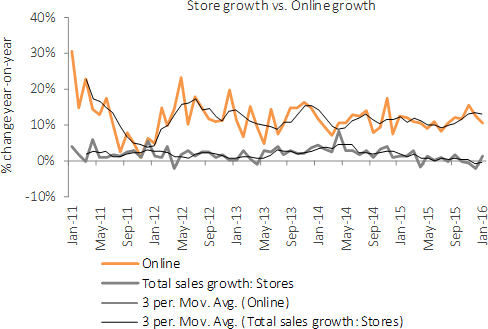Retail sales bounce back in January, but tougher times ahead
Retail sales rose by 2.2 per cent year-on-year (non-seasonally adjusted) in January according to the Retail Economics Sales Index. The three month rolling average, which provides a more accurate underlying trend, rose to +0.6 per cent, from a six-year low of 0.1 per cent in the previous period.Retail Economics Sales Index: Total retail sales

Source: Retail Economics - Retail Sales IndexOverall, the main engine of growth in the economy remains centred around consumer spending. Cheap petrol, food, energy bills and an increasing appetite for credit has left households with a windfall. These latest figures show that when consumers are in the mood, they are prepared to spend within retail. However, deep and widespread discounts are needed to tempt then onto the high street which is likely to have eroded retailers’ margins. According to the ONS, average store prices fell by 2.6 per cent in January, year-on-year, the 19th consecutive month of falling prices.The stand-out performers were Health and Beauty (+8.7 per cent), Electricals (+3.6 per cent), Furniture and Flooring (+3.2 per cent) and Homewares (+1.6 per cent). Consumers reacted well to seasonal promotions across ‘home’ related products. Anecdotally, the cool weather in January boosted the sale of cold and flu remedies while slimming products also reportedly sold well. Average temperatures dropped to 4.5 degrees Celsius from 7.9 in December. Despite cooler weather, consumers did not react well to seasonal promotions in Clothing and Footwear. For many clothing and footwear retailers, the mild winter led to lost sales rather than pent-up demand over the period. Many retailers were forced to heavily discount in order to shift stock, sacrificing margins. Food sales continued their recent run of better performance with sales up 0.8 per cent, year-on-year, outperforming the average growth rate of -0.2 per cent for the whole of 2015. Food deflation is expected to ease in the coming months with inflation likely to return towards the end of Summer 2016. This will boost top line growth for the grocery sector although margins will remain under intense pressure from the fiercely competitive environment. Retail Economics estimates that total online sales performed well, up 10.4 per cent in January. According to the ONS figures, the strongest growth came from Online Household Goods which rose by +32.6 per cent. However, given the overall performance of the sector, Online could have performed better. In fact, our estimate of Store sales suggest growth of 1.2 per cent in January as shoppers hit the high street. This is considerably higher than average Store sales growth of 0.5 per cent for 2015. The boost in Store sales is also supported by the latest footfall data produced by Springboard which suggests growth of 1.2 per cent in January - the best performance for two years.

Source: Retail Economics analysisFootfall trends across Retail Parks remained strong with traffic up 5.2 per cent, year-on-year. Shopping Centre footfall was flat but High Streets saw a rise of 0.2 per cent. Overall, the latest retail sales figures are very positive following a lacklustre end to 2015. However, we remain cautious that, although the economic recovery continues to be consumer-led, the retail sector is still not benefitting to the same extent as other parts of the consumer sector. A comparison of the BRC’s Retail Sales Monitor and the Coffer Peach Business Tracker, which measure the performance of around 30 bars and restaurant chains, shows that leisure spending has consistently outpaced retail sales growth over the last 18 months. Arguably, during the recovery a trend has developed towards the pursuit of experiences and service-based consumerism over material goods which has shifted spending away from traditional retail. Although the fundamentals underpinning UK households remain robust, the boost in consumer spending has not flowed through to the retail sector in the manner that would have been expected just a few years ago. This shift to a more experiential-based retail experience will favour retailers in out-of-town retail parks, where destinations have a greater mix of retail and leisure.
Back to Retail Economic News